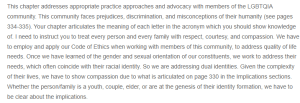Advocacy and Inclusive Practice- Supporting the LGBTQIA Community Needs
We are learning more about the struggles that members of the LGBTQUIA community confront as their numbers continue to rise, particularly in light of the fact that most institutions were created with heterosexuals in mind. Therefore, it only makes sense that society adapts, or transforms, to accommodate this community in the same way it does for everyone else. One of the changes that can be made by counselors is through clinical practices that are culturally competent and sensitive to the unique challenges and needs of this population.
One example of these clinical practices is affirmative therapy. This approach emphasizes support, validation, and affirmation of the client’s sexual orientation, gender identity, and expression. Besides, counselors should examine their own biases, especially heterosexist bias, which can manifest in the way they talk, for example, using terms like partner instead of a boyfriend when talking to ladies (Sue et al., 2022). This way counselors create a safe and accepting environment where clients feel comfortable exploring their identities.
The second clinical practice uses an intersectional approach. This involves recognizing that individuals within the LGBTQUIA community may also belong to other marginalized groups (e.g., people of color, and disabled individuals) and understanding how these intersecting identities impact their experiences and mental health needs. This perspective recognizes that a variety of characteristics, including race, ethnicity, disability, socioeconomic class, and more, intersect and have an impact on people’s identities and experiences (Sue et al., 2022). For instance, LGBTQUIA People from minority racial or ethnic groups may experience prejudice that is more severe and suffer particular difficulties because of both their racial or ethnic identity and their sexual orientation or gender identity. An example of this is that a Muslim gay individual will face more discrimination and homophobia, especially from their family, than a non-Muslim person would.
Thirdly, another crucial clinical practice that counselors should implement in institutions is helping clients build support networks within and outside the LGBTQUIA community, including friends, family, support groups, and community organizations. Support is crucial for LGBTQUIA community members as it promotes validation, mental health, resilience, social connection, access to resources, empowerment, and identity development.
References
Sue, D. W., Sue, D., Neville, H. A., & Smith, L. (2022). Counseling the culturally diverse: Theory and practice. John Wiley & Sons
ORDER A PLAGIARISM-FREE PAPER HERE
We’ll write everything from scratch
Question
This chapter addresses appropriate practice approaches and advocacy with members of the LGBTQIA community. This community faces prejudices, discrimination, and misconceptions of their humanity (see pages 334-335). Your chapter articulates the meaning of each letter in the acronym which you should show knowledge of. I need to instruct you to treat every person and every family with respect, courtesy, and compassion. We have to employ and apply our Code of Ethics when working with members of this community, to address quality of life needs. Once we have learned of the gender and sexual orientation of our constituents, we work to address their needs, which often coincide with their racial identity. So we are addressing dual identities. Given the complexity of their lives, we have to show compassion due to what is articulated on page 330 in the Implications sections. Whether the person/family is a youth, couple, elder, or are at the genesis of their identity formation, we have to be clear about the implications.

Advocacy and Inclusive Practice- Supporting the LGBTQIA Community Needs
We have to be sensitive that some families struggle when a family member emerges with their identity. So working with families may prove difficult, and we should be guided by what is comfortable for the constituent. What are three clinical practices we should employ in our agencies and institutions that address LGBTQUIA community needs?

